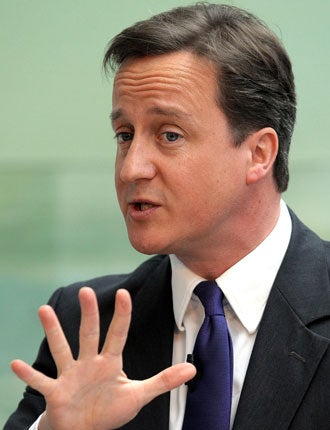Cameron faces revolt on electoral reform

Your support helps us to tell the story
From reproductive rights to climate change to Big Tech, The Independent is on the ground when the story is developing. Whether it's investigating the financials of Elon Musk's pro-Trump PAC or producing our latest documentary, 'The A Word', which shines a light on the American women fighting for reproductive rights, we know how important it is to parse out the facts from the messaging.
At such a critical moment in US history, we need reporters on the ground. Your donation allows us to keep sending journalists to speak to both sides of the story.
The Independent is trusted by Americans across the entire political spectrum. And unlike many other quality news outlets, we choose not to lock Americans out of our reporting and analysis with paywalls. We believe quality journalism should be available to everyone, paid for by those who can afford it.
Your support makes all the difference.David Cameron faces a revolt inside the Conservative Party over his decision to grant the Liberal Democrats a referendum on the voting system for Westminster elections.
Tory MPs plan to make it harder to secure a "yes" vote in any referendum on the alternative vote (AV). The wrecking tactics will anger the Liberal Democrats, because the promise of a chance to change the system was a crucial factor in the agreement to join the coalition.
Daniel Kawczynski, chairman of the all-party group for the current first-past-the-post system, said he would table an amendment to the Bill paving the way for a referendum saying that 40 per cent of the electorate would need to support change in the public vote before it could be implemented. That would need a high turnout. A similar amendment scuppered plans for Scottish devolution in a 1979 referendum. The plan was supported by 52 per cent of those voting but that amounted to only 33 per cent of the electorate.
Mr Kawczynski, the Tory MP for Shrewsbury and Atcham, said: "If we are to hold a referendum on AV, it is only fair that any changes are implemented if they hold the support of a clear majority of the electorate. Fundamental constitutional change should not be enacted by process of a knee-jerk reaction. It is all-too easy for voters to pledge support for change to the electoral system; understanding the implications of this change is, however, something different. But the implications of AV could not be clearer: a more disproportional system; legislative gridlock; impersonal politics."
Tory whips will try to squash the rebellion when the Bill comes before Parliament to head off a row that may put the coalition under strain. But the proposed amendment could attract the support of some Labour MPs who support first-past-the-post.
Yesterday Mr Cameron tried to calm Tory critics of the Government's plan to raise capital gains tax (CGT) from 18 to 40 or 50 per cent, a Liberal Democrat demand. He told business leaders in Shipley, West Yorkshire, that the issue of wealthy people paying CGT to avoid higher income tax was a problem but also an opportunity.
Hinting that savers and entrepreneurs would be protected, he said: "People should not get ahead of themselves and wait for the Budget." He added: "First, we must do all we can to promote entrepreneurism. Second, we must address this problem we have in the tax system of a capital gains tax rate of 18 per cent against much higher income tax, which is encouraging tax avoidance. At the same time, remember what we are trying to do here is a modest additional revenue-raising exercise so we can lift the income allowances, which will actually help the poorest people in our country."
In his first major speech since becoming Prime Minister, Mr Cameron promised to transform the economy and "make the next decade the most entrepreneurial and dynamic in our history". He said he would appoint "city ministers", senior MPs to help big cities drive forward economic development and clear blockages in Whitehall.
The Tories and Liberal Democrats took first and second places in the delayed general election contest in Thirsk and Malton, North Yorkshire. Tory Anne McIntosh won with 20,167 votes, while the Liberal Democrats' Howard Keal drew 8,886 votes in Thursday's election, pushing Labour's Jonathan Roberts into third place with 5,169. The election was postponed after the April death of the UK Independence Party candidate John Boakes.
Join our commenting forum
Join thought-provoking conversations, follow other Independent readers and see their replies
Comments